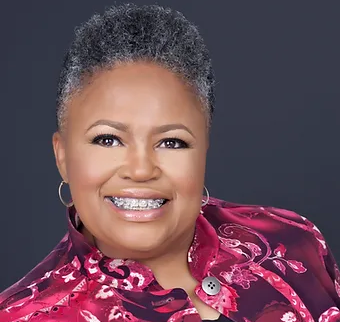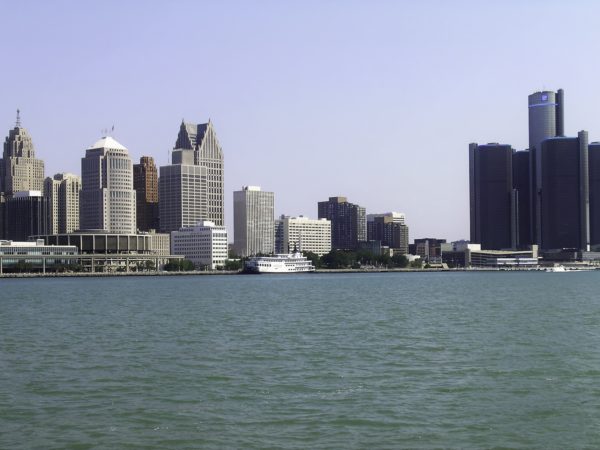
Details matter for water rights advocate Monica Lewis-Patrick when it comes to terminology in Michigan’s long-awaited drinking water legislation. Critical issues have to be addressed in a manner that improves people’s lives.
The recently introduced legislation is designed to remedy the need for water shutoffs in limited cases, It’s also meant to address the cost of water for residents across the state who don’t have the means to pay seemingly ever increasing water bills.
But according to Lewis-Patrick, it’s not enough.
What’s needed in Michigan is a true affordability plan, Lewis-Patrick told Great Lakes Now. What’s proposed is an assistance plan that will provide some relief to ratepayers.
“We don’t believe right now that the legislation on the table goes far enough to meet the bar of affordability,” she said.
Detroit’s Lewis-Patrick is co-founder and CEO of the non-profit group, We the People of Detroit, and has worked on water justice issues in Detroit and Michigan since 2009. She also serves on a White House advisory council on water affordability.
In a Great Lakes Now interview, Lewis-Patrick described the early challenges of debunking the narrative that Black people in Detroit didn’t want to pay their fair share for water. And she pointed out that as the federal government began divesting from water as far back as 1977, the financial burden shifted to the states, then to municipalities and eventually to ratepayers, whose incomes didn’t keep pace.
She also made the distinction between shutoff protection and ending shutoffs, the “wiggle room” the legislation gives water utilities and the need to frame water justice as a statewide issue, not one confined to disinvested urban areas like Detroit, Flint and Benton Harbor, with majority Black populations.
Shutoffs
“We believe that shutoffs should be ended and believe they can be ended,” Lewis-Patrick said. But she insisted that in communities like Detroit, Flint, Saginaw, Highland Park, Benton Harbor, Oscoda and more across the state, what’s really needed is more affordable water.
As legislation was being drafted, various groups provided input and not having the ability to shut off water was a deal breaker for the utilities, Lewis-Patrick told Great Lakes Now.
By contrast, in 2019 former Chicago Mayor Lori Lightfoot ordered an end to shut offs, calling them “heartless.” When you cut somebody off from water, you’re effectively evicting them and putting them on the street,” said Lightfoot.
The proposed legislation does provide protection against shutoffs in cases where a customer is facing certain health issues and for ratepayers making minimum payments.
Wiggle room and the biggest concern
Another concern is the “wiggle room” the legislation gives utilities, as first reported by Planet Detroit. It contains a lot of utilities may, instead of utilities shall, according to Lewis-Patrick.
“It leaves a lot of latitude to the utilities to decide what pieces and parts they will implement and to what degree,” said Lewis-Patrick.
But her biggest concern is that assistance to ratepayers is temporary and does not address the fact that for many across the state, water is unaffordable.
She said a true affordability program must be long-term and have more accountability and transparency.
Great Lakes Now asked Lewis-Patrick if this legislation would have been introduced if the issue were confined to majority Black urban areas, without making the case that it’s a statewide issue.
“Oh no, I mean no,” she said. “You’ll really never move something in this state or this country just based on the needs of Black people. This was about human rights and improving the quality of life for all Michiganders.”
Asked if the legislation’s passage will make Michigan a leading state on drinking water affordability, Lewis-Patrick said no one really knows. “Right now the way the legislation reads, it’s a temporary response that we know doesn’t have enough funding and won’t go far enough in terms of assuring protections.”
Lewis-Patrick praised state Sen. Stephanie Chang for being a champion on the affordability issue and commended Gov. Gretchen Whitmer for previously allocating budget resources. Chang first sponsored water equity legislation in 2015 during her first term as a state representative and a year after graduating from the University of Michigan.
Lewis-Patrick said she looks forward to working through the amendment process to improve the legislation and believes there are legislators who are willing to engage on those issues.
Catch more news at Great Lakes Now:
Great Lakes EPA office reaffirms 2030 cleanup goal for Detroit River, other contaminated sites
Researchers: Current Great Lakes stewardship is “ill-equipped” to handle future challenges
Featured image: Monica Lewis-Patrick
1 Comment
-
I’ve been working on this issue in Oakland County for almost three years, with a large stakeholder group including community activists, elected officials from local to US Senate, engineers, lawyers and ratepayers. Since then we have been working on this with Sen. Stephanie Chang to develop the legislation now before the Michigan legislature.
This legislation creates a sustainable water affordability plan for Michigan that will help low income families across the state receive a subsidy for their water bills that will keep their bills at three percent, or lower, of their income as long as they need that assistance. This is not intended to be temporary, as long as they qualify they will receive benefits. This includes plumbing, repairs, and arrearages from unpaid balances.
My office also includes workforce development as a tool for community improvement because there is no better solution to poverty than a higher paying job and our industry needs employees.
Our affordability coalition did not include Candace Miller because she has not been in a position to set water/sewer rates for 30 years and has no knowledge of how rates are set or how many people are having issues in the communities of Macomb county, or anywhere across Michigan, today. My office operates and maintains systems in 17 communities and we do rate setting and billing for almost all of those. We have a long history of operating water/sewer utilities, and that experience led to us recognize the need for a sustainable affordability program.
We received a state grant to do in-depth research, nationwide, on affordability programs, and found that none have been able to sustainably succeeded on a long-term basis, because attempting to do this on a localized level cannot balance the needs of the poor with the needs of all rate payers. Like the electric/gas utility affordability programs, it must be statewide to spread the costs enough not to impact any particular community. It doesn’t work to have holes all across the state. The current utility programs passed with wide bipartisan support over a decade ago, and have been very successful in keeping power affordable while protecting their profits. Water utilities in Michigan do not make profits, they are government entities that can’t make a profit or spend funds outside their systems.
Every dollar that is late, discounted or unpaid is funding not spent operating, maintaining or improving the system, so is put on the next years’ rates as an increase, or the work doesn’t get done.
This subsidy program will allow communities to bring relief to their low income residents, lower costs for the system and allow more system work to be done because there is a is a more steady income source.
I have yet to meet a single water/sewer system operator who says this is not a problem or that they wouldn’t be helped by a more steady source of income. In many communities, this is a case of environmental justice, and not just in minority communities, but systems across the state, urban and rural. For that reason, we must have a system that works for all the people and is able to pay for the true cost of service for the long run.




